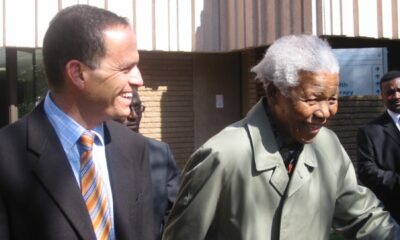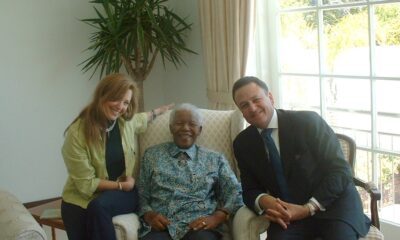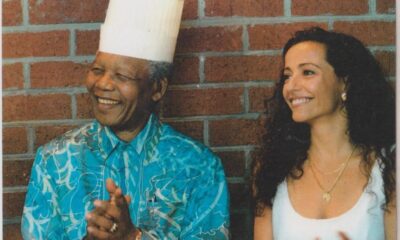
Featured Item

Madiba understood unifying power of sport, says Bacher
He turned the Springboks’ historic win at the 1995 Rugby World Cup into a unifying national force and helped engineer South Africa’s return to the international cricket pitch in 1991. As Heritage Day approaches, veteran cricketer and administrator, Dr Ali Bacher, recalls Nelson Mandela’s impact on our sporting legacy.
“It has the power to unite people in a way that little else does. Sport can create hope where there was only despair.” Mandela’s words revealed his innate understanding of the role sport plays in uplifting and connecting South Africans.
Bacher reflected on his interactions with Mandela on and off the sports field. Together with his close friend, the late Steve Tshwete who became sports minister in 1994, Bacher helped to spearhead South Africa’s return to international cricket in June 1991.
“We again became members of the International Cricket Council [ICC], because for the first time ever, we had one non-racial cricketing body for South Africa,” he said. “We didn’t talk about international cricket matches at that time, all we wanted to do was to rejoin the ICC.”
It was Mandela himself who opened the door for the South African cricket team to appear on the international stage. Following South Africa’s ICC acceptance, Bacher invited West Indian cricket captain, Clive Lloyd, to visit South Africa to survey the cricket scene and township development programme. Upon Lloyd’s arrival, he asked to meet Mandela.
The meeting was short but friendly as a Swedish delegation of reporters were waiting outside to see Mandela, Bacher recalled. When the Swedish media entered afterwards, they asked Mandela for his thoughts on South Africa’s exclusion from the upcoming 1992 Cricket World Cup in Australia and New Zealand.
“All he said was, ‘They must definitely be invited,’” said Bacher. “That’s the power of Nelson Mandela. Those words went around the world in a second and the next day, I was called by Sri Lanka’s president.” An emergency meeting in Sharjah, United Arab Emirates, swiftly followed, at which ICC member countries voted overwhelmingly in favour of South Africa’s participation in the World Cup.
In February 1993, South Africa hosted a cricket tournament with the West Indies and Pakistan, who ultimately competed in the finals at the Wanderers Stadium. “On the day of the finals, I got a phone call from Steve saying that Madiba would like to come watch the cricket,” Bacher said. He collected Mandela outside the stadium, and escorted him to the Long Room suite. It was the first cricket match Mandela had ever watched.
At teatime, he offered to meet the players in their change room and afterwards, chose to return with Bacher via the field. Bacher has never before shared the story of what happened next.
“We’re walking along the boundary rope, and after about 13m, a white gentleman jumps over the fence and throws an orange at Mandela. I’m on the right of Mandela, and you won’t believe it, I catch this orange in my right hand. And we carry on walking as though nothing happened.”
Later Bacher asked Mandela’s main security guard if Mandela had seen the orange. “He said, ‘Of course’, so I asked why he hadn’t stopped. He said that Madiba wasn’t going to give that gentleman the pleasure of showing him that that orange had frightened him.”
Arguably the most seminal Mandela sporting moment occurred in 1995. Amid the excitement of the Rugby World Cup in South Africa, Mandela announced that he would support the Springboks. That same day, a television crew came to Bacher’s house to ask for his response.
“I said that though we respect Mr Mandela enormously, we wouldn’t support our national cricket team to play as Springboks. This was because cricket had now united, and among our black administrators and players, ‘Springboks’ was an ugly word because it denoted a part of our existence that prevented blacks from playing for the national cricket team.”
Upon seeing Bacher’s response, Mandela explained his reasons for supporting the Springboks, saying, ‘I understand what rugby means to the Afrikaner. The Afrikaner, by and large, has accepted me as the president of their country, and this is my way of saying thank you to them.’”
As the final approached, Tshwete told Bacher that he had received a call from Mandela asking him to bring a number six jersey to Ellis Park Stadium – the same number as Springboks captain Francois Pienaar. “Steve doesn’t know what it’s about, but I tell him where to get a jersey,” Bacher recalled. He later heard from Springbok Joel Stransky how, before the match, Mandela went to each player and told them how important it was for the country to win the final.
“I was at the match, and when Madiba walked onto the field wearing the Springbok rugby jersey, I don’t think I’ve ever heard an ovation like the one he received. And we won.”
Bacher also reminisced about how difficult it was to say no to Mandela. When in 1997, the president invited him for tea, he asked, “Would you agree that in a small way, I helped you get back into world cricket?”
“I said, ‘Of course’. Mandela then told Bacher about a small village he’d visited near Polokwane with no toilets and dilapidated buildings.
“He said, ‘Ali, it would be a nice gesture if Cricket SA gave me R1 million to help this community.’ While Bacher was agreeable, he met opposition from the board, which feared the move would lead to a barrage of requests from other charities.
“I told them, ‘I see what you’re saying, but you can tell him I won’t’,” Bacher recalled. Board chairperson, Raymond White, then instructed those opposed to put up their right hand, but no-one did so. “They were terrified that it would go around the country that the Cricket Board wouldn’t support Mandela’s request,” Bacher said.
“The next morning, I took my family to Madiba’s house for tea. Madiba put my two eldest grandchildren, then six, on his lap and started to sing to them. He was an extraordinary person. I feel honoured that I had a warm relationship with him.”










